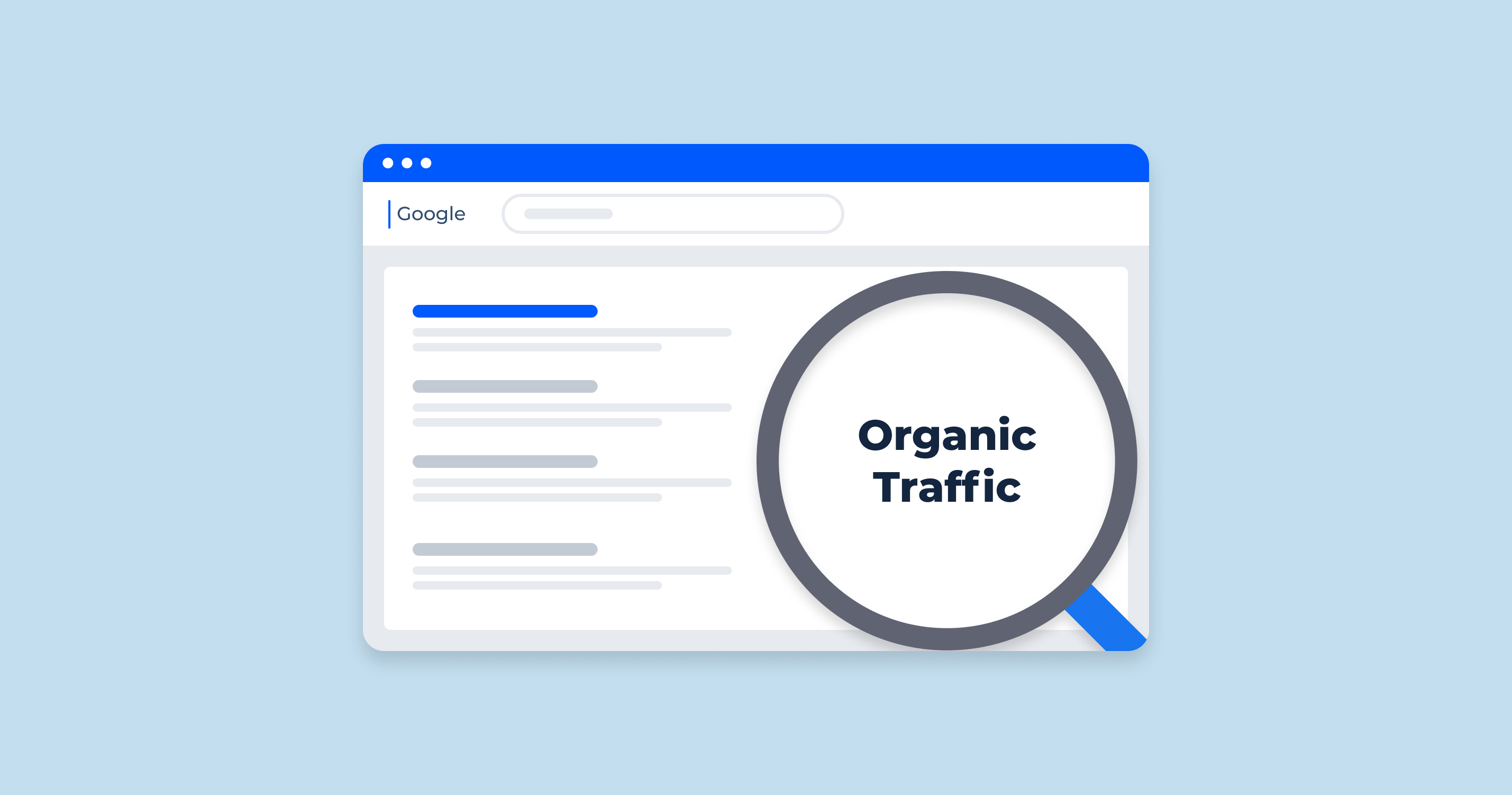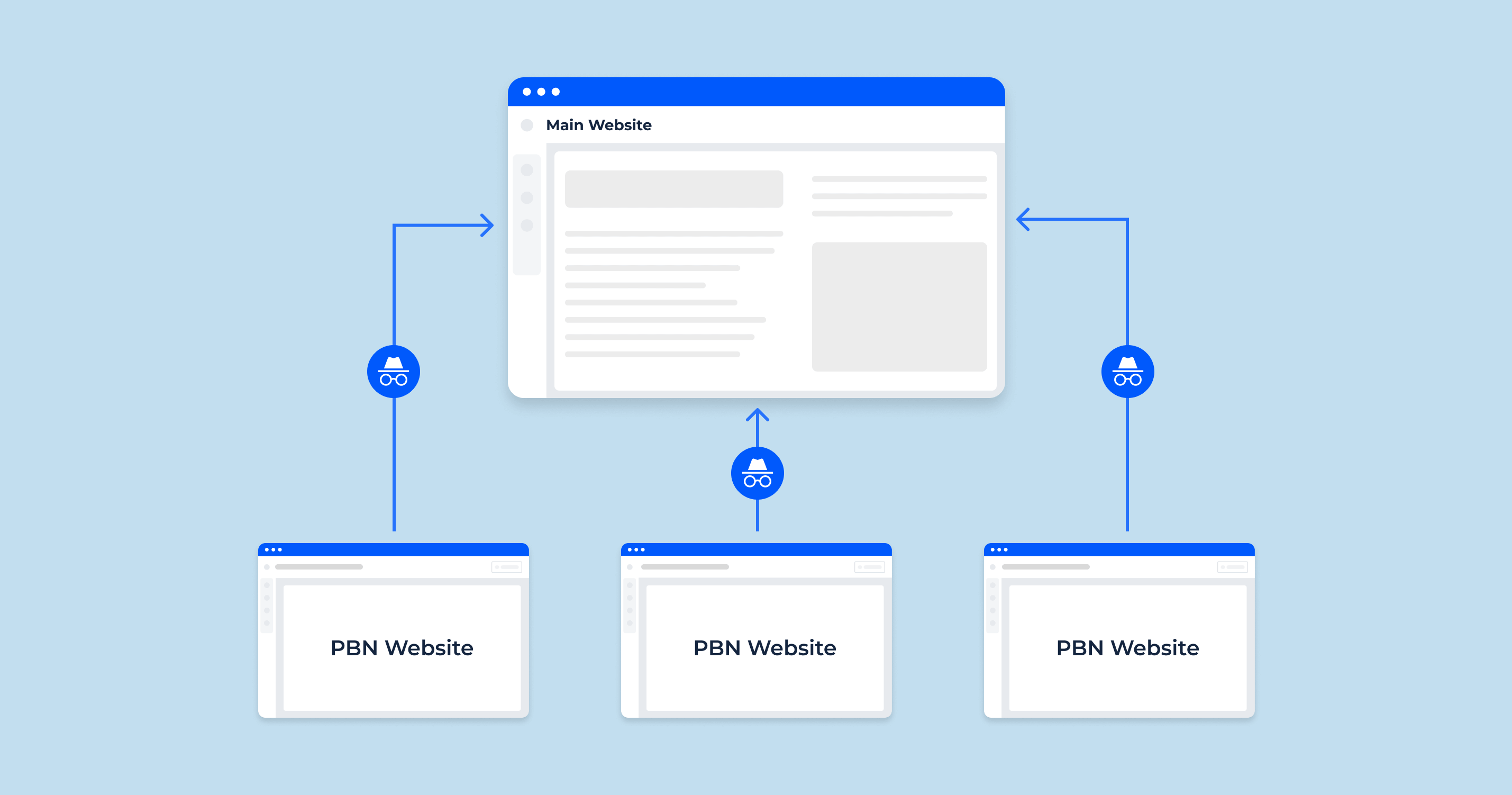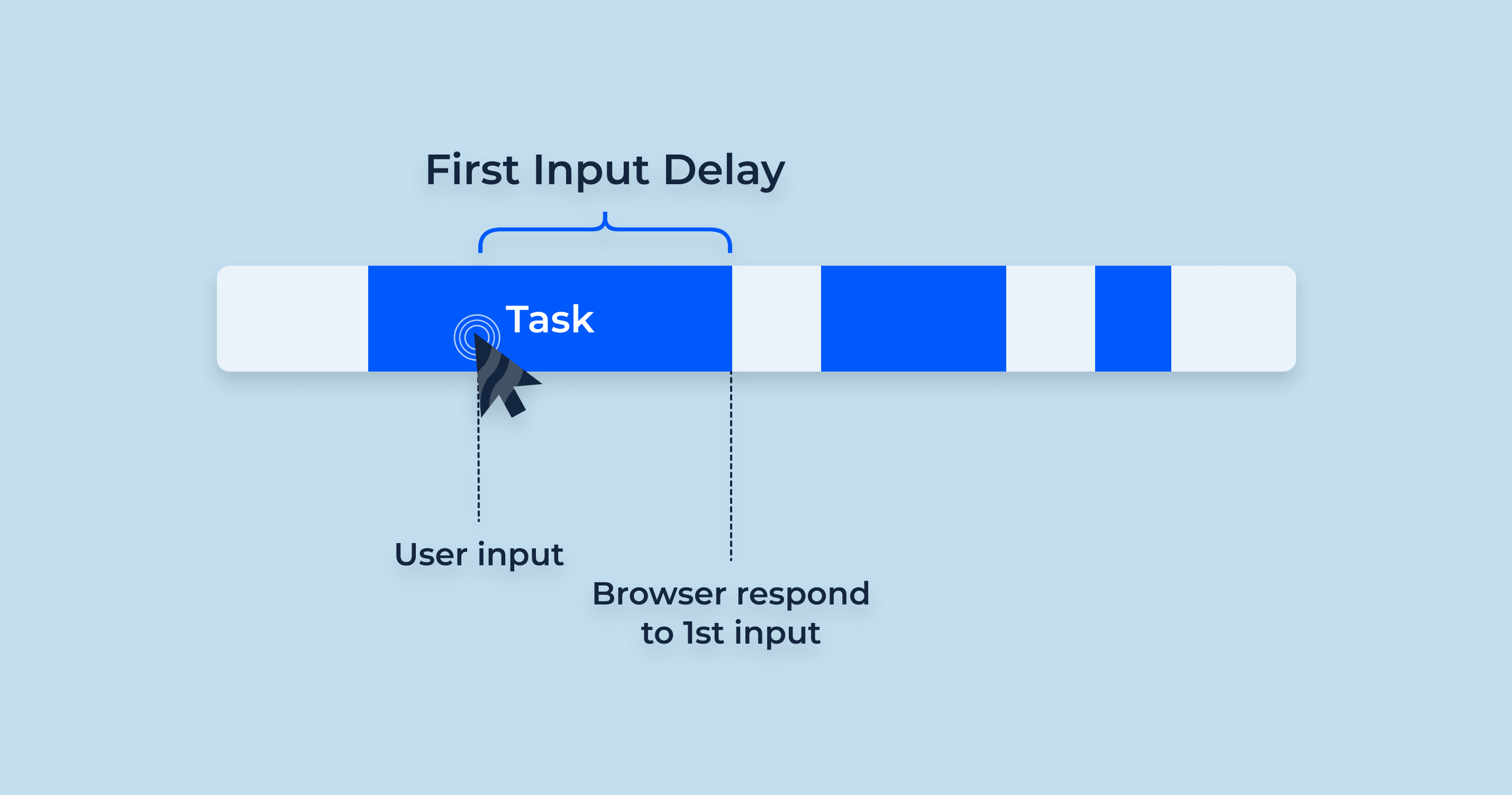Organic traffic refers to the visitors that land on your website as a result of unpaid (“organic”) search results. This traffic is generated by users finding your website among search engine results, rather than through paid advertising or other promotional efforts.
When someone types a query into a search engine like Google, the search engine uses its algorithms to provide the most relevant results. If your website or page has content that matches that query well, and the site is well-optimized for search engines, it may appear in these organic search results. If a user then clicks on that link and visits your site, that’s considered organic traffic.
SEO strategies are typically used to increase the amount and quality of organic traffic to a website by improving its visibility in search engine results. These strategies include keyword optimization, backlinking, and producing high-quality, relevant content.
Google Analytics and Google Search Console for Analyzing the Website’s Organic Traffic
Google Analytics and Google Search Console are two excellent tools for analyzing your website’s organic traffic. Here’s how you can use them:
Google Analytics
- Sign in to your Google Analytics account.
- Click on the website for which you want to see the organic traffic.
- On the left side of the screen, you’ll see a menu. Navigate to: Acquisition -> All Traffic -> Channels.
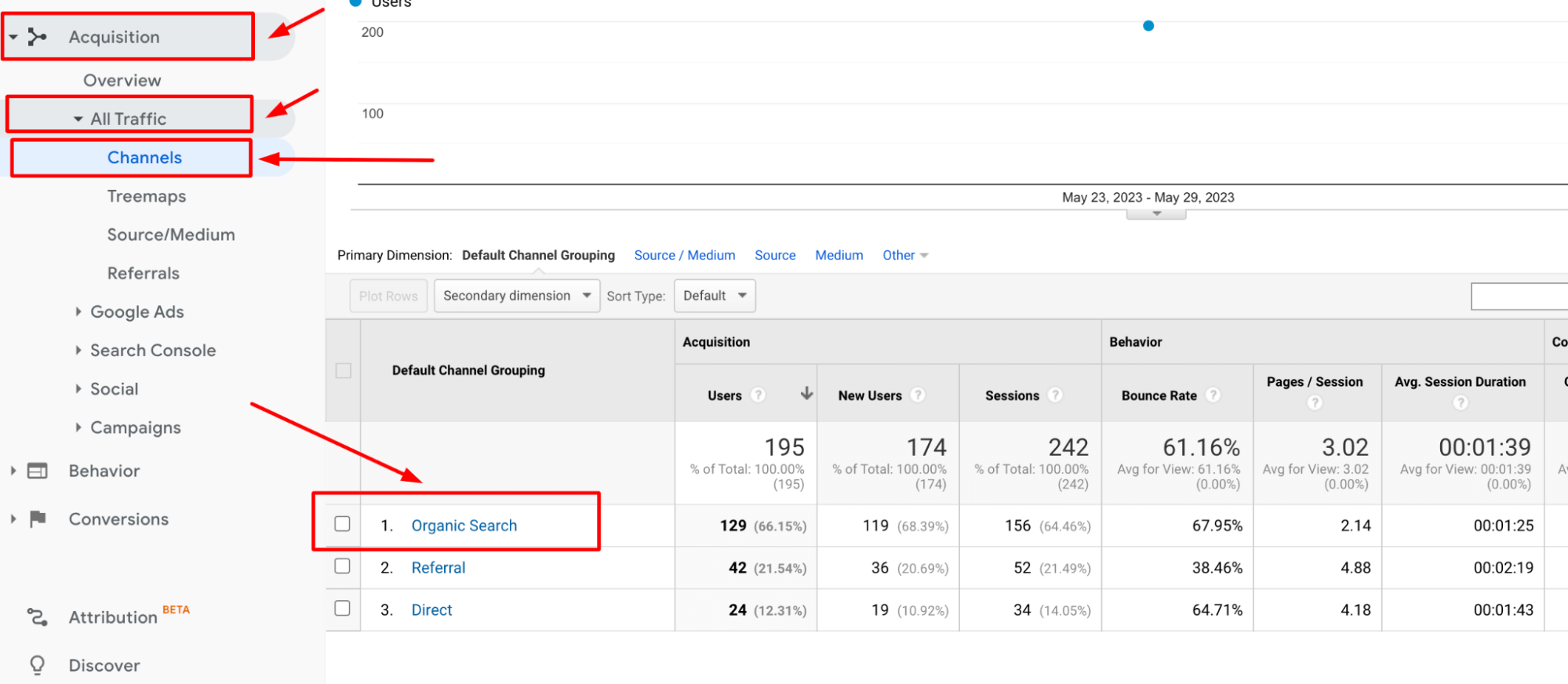
On the Channels page, you’ll see a list of channels, including “Organic Search.” Click on “Organic Search,” and you’ll see a detailed report of your website’s organic traffic.
Google Search Console
- Sign in to your Google Search Console account.
- Click on the website for which you want to see the organic traffic.
- Click on ‘Performance’.
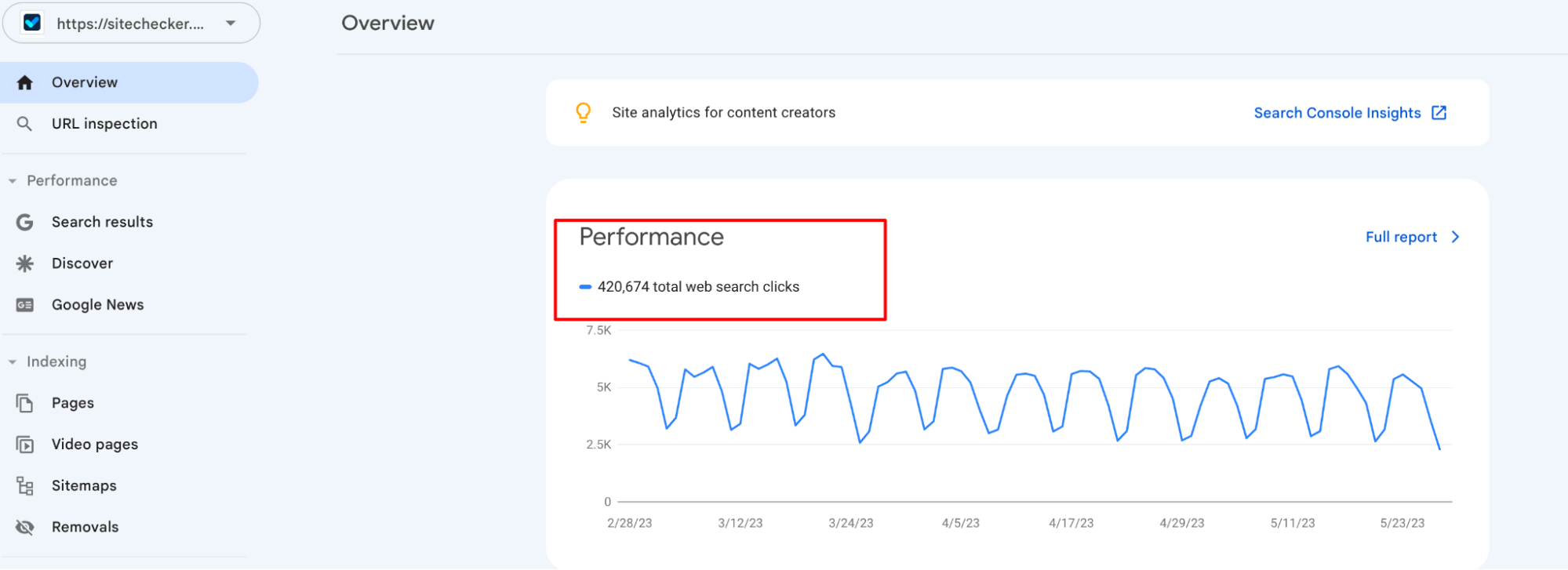
In the Performance report, you’ll see a graph of your website’s performance over time, including the total clicks, total impressions, average CTR (click-through rate), and average position.
Below the graph, you’ll see ‘Queries’, ‘Pages’, ‘Countries’, ‘Devices’, ‘Search Appearance’, and ‘Dates’. ‘Queries’ shows the search terms people used to find your site, and ‘Pages’ shows which pages on your site were shown in search results.
Remember, Google Analytics focuses more on user behavior (sessions, bounce rate, time on page, etc.), while Google Search Console is more focused on website performance in Google Search results (impressions, clicks, position, etc.).
Both are crucial for a comprehensive understanding of your website’s organic traffic.
Organic Traffic in Marketing
In marketing, organic traffic refers to visitors who come to your website through unpaid search results, as opposed to paid advertisements. Essentially, these are users who find your website naturally when using a search engine like Google, Bing, or Yahoo.
Organic traffic is often considered the most valuable type of web traffic for several reasons:
- High Intent. Organic traffic often has high intent, meaning these users are actively searching for information, products, or services that your website provides. They’re more likely to engage with your content, make a purchase, or perform other valuable actions.
- Cost-Effective. Unlike paid advertising, organic traffic is ‘free’. It doesn’t require a direct cost per click or impression, making it a cost-effective way to bring visitors to your site. However, it’s important to note that improving organic traffic often involves indirect costs, such as investing in SEO or content creation.
- Sustainable. Organic traffic is more sustainable in the long run than paid traffic. Once you’ve established a strong SEO foundation and search engine presence, your website can continue to attract organic traffic over time, even without ongoing advertising spend.
- Credibility and Trust. Users often trust organic search results more than paid advertisements. If your site consistently shows up in organic search results, it can enhance your brand’s credibility and build trust with your audience.
In marketing, strategies to increase organic traffic often involve SEO, content marketing, social media engagement, and other tactics designed to increase your website’s visibility in search engine results.
Organic Traffic Impact SEO
Organic traffic is closely intertwined with SEO. They both influence each other in various ways, and it’s difficult to discuss one without considering the other.
Here’s how organic traffic impacts SEO:
| Relevance and Ranking | When search engines see that your website is generating a significant amount of organic traffic, they infer that your site provides valuable content that is relevant to user queries. This can positively impact your site’s search engine rankings. |
| User Engagement Metrics | User Engagement Metrics: High organic traffic often correlates with good user engagement metrics, such as low bounce rates, high time on site, and high pages per session. Search engines consider these metrics when determining site rankings. If your organic traffic is engaged and interacts positively with your site, it can boost your SEO. |
| Conversion and Sales | More organic traffic increases the likelihood of conversions and sales, especially if the traffic is high-quality (i.e., users are genuinely interested in your products or services). While direct conversions aren’t a ranking factor for search engines, a well-optimized site that converts well is likely also optimized for good user experience, which is a ranking factor. |
| Authority and Trust | Sites that generate a lot of organic traffic tend to be viewed as more authoritative and trustworthy. This reputation can indirectly benefit SEO, as other sites might be more likely to link to you (increasing your backlinks), and users might be more likely to engage with and share your content. |
It’s also important to note the reciprocal relationship between SEO and organic traffic: good SEO practices will improve your organic traffic, and a steady stream of organic traffic indicates to search engines that your site is a valuable, relevant resource, which can boost your SEO. So, they both feed into each other to create a positive cycle of improved visibility and increased traffic.
Common Reasons Why a Website Might Not be Getting Much Organic Traffic
There are several common reasons why a website might not be getting much organic traffic, and each of these problems has potential solutions:
1. Poor SEO
If your website isn’t optimized for search engines, it may not rank well in search results.
Solution: Implement SEO best practices, including keyword optimization, meta tags optimization, improving site loading speed, mobile-friendly design, and creating high-quality, original content.
2. No Indexed Pages
If your website’s pages are not indexed by search engines, they won’t appear in search results.
Solution: Use tools like Google Search Console to submit your sitemap and request indexing for your site. Make sure your website’s robots.txt file is not blocking search engines from indexing your site.
3. Low-Quality Content
If your content isn’t valuable, unique, or relevant to your target audience, your website may not attract much organic traffic.
Solution: Focus on creating high-quality content that provides value to your audience. Research and understand your target audience’s needs and interests, and tailor your content to those insights.
4. No Backlinks
Backlinks, or links from other websites to your site, are a crucial factor in search engine ranking algorithms.
Solution: Engage in link building strategies, such as creating high-quality content that others want to link to, guest posting on other blogs, and building relationships with influencers in your industry.
5. Poor User Experience
If your website is hard to navigate, doesn’t load quickly, or doesn’t work well on mobile devices, users might leave quickly, which can hurt your rankings and decrease your organic traffic.
Solution: Improve the user experience by making your site easy to navigate, improving page load times, and ensuring your site is mobile-friendly. A good user experience can also increase the amount of time visitors spend on your site, which can further improve your SEO.
6. No Social Media Presence
While social media doesn’t directly influence search engine rankings, having a strong social media presence can help you build your brand and attract more traffic to your site.
Solution: Engage with your audience on social media platforms where they are active. Share valuable content, respond to comments, and use social media to drive traffic to your site.
Remember, it takes time to build organic traffic, and it’s a continuous process. Keep learning about SEO, staying up-to-date with the latest practices, and making adjustments to your website and strategy as needed.
Traffic Checker for Managing Organic Traffic
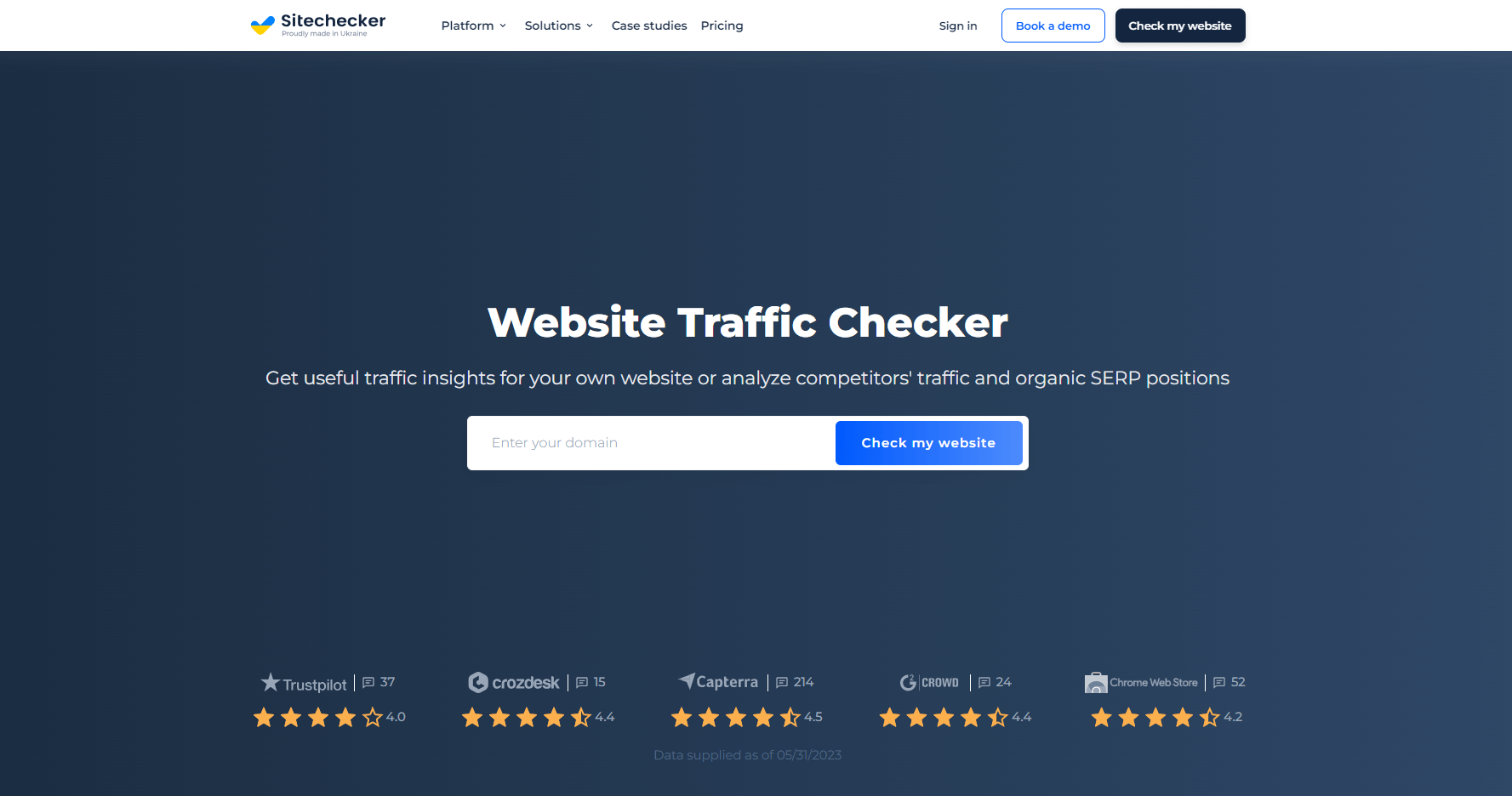
Website Traffic Checker tool is instrumental for managing organic traffic as it provides key insights into a website’s performance in organic search. It offers information about the audience demographics, their browsing behavior, and the popularity of different pages, helping you optimize your content and SEO strategies to match user preferences. By revealing traffic sources, it helps identify if search engines are driving adequate traffic and if SEO efforts need improvement.
The tool may also offer insights into competitors’ performance, enabling a comparative analysis that can shape your SEO tactics.
Monitoring traffic trends over time helps understand the effectiveness of implemented strategies and tweak them for better organic visibility.
Thus, a traffic checker tool is a valuable asset in enhancing organic traffic, making informed decisions, and refining your SEO strategy.
Conclusion
Organic traffic refers to visitors who find your website through unpaid search results, and it’s a primary goal of SEO.
Here we emphasized the importance of organic traffic in marketing due to its high user intent, cost-effectiveness, sustainability, and ability to build credibility and trust.
It outlined how to use Google Analytics and Google Search Console for tracking organic traffic and the role of SEO strategies in driving such traffic. Additionally, the interrelationship between organic traffic and SEO was discussed, where high organic traffic suggests relevant content, potentially enhancing search engine rankings.
Some common reasons for a lack of organic traffic could be poor SEO, no indexed pages, low-quality content, lack of backlinks, poor user experience, or no social media presence.
Traffic checker tool help manage organic traffic effectively providing insights into audience behavior, traffic sources, popular pages, and competitor analysis.
